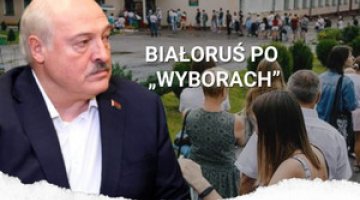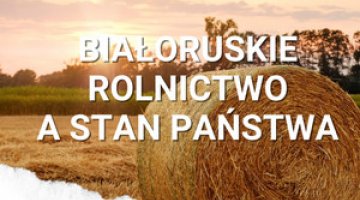The anti-Western narrative in Belarus’s historical policy becomes harsher
On 6 January 2022, during a meeting to discuss historical policy, Alyaksandr Lukashenka stressed that the “correct interpretation of history” is of key importance to the state’s security. He ordered historians to review the descriptions of specific periods in history which have been promoted thus far, and to formulate an “appropriate” assessment of the successes and failures of the Belarusian nation throughout its history. He paid particular attention to the era of the Polish-Lithuanian Commonwealth and said that Belarusians living in the Grand Duchy of Lithuania (GDL) were exploited and deprived of their national identity by Polish magnates and other members of the aristocracy. As a consequence, he suggested that the term “Polish occupation” be included in textbooks and museum exhibitions.
In an effort to justify the need to modify Belarus’s historical policy, Lukashenka made a reference to street protests organised in the wake of the presidential election held on 9 August 2020. According to him, the riots would not have happened had the view that Belarusian lands were elements of Europe’s historical heritage in the GDL era not been excessively promoted in school curricula and museums. Alongside this he stressed the need to emphasise the Belarusian aspects of both the GDL and two early medieval principalities: the Principality of Polotsk and the Principality of Turov. He also stressed the need to glorify the achievements of Belarusian heroes of the Great Patriotic War (GPW) and the positive aspects of the Soviet era.
On 5 January 2022, Lukashenka signed a law on the genocide of the Belarusian nation, which envisages that “Nazi criminals, their accomplices and nationalist formations” responsible for crimes against the citizens of the BSSR during the GPW and in the post-war period until 1951, should be prosecuted and punished (the details of the penalties were not provided). In addition, the document stipulates an amendment to the criminal code to include provisions which will enable the prosecution of individuals who in their public statements, academic and journalistic publications, and in social media posts deny the fact that the Belarusian nation was subjected to “genocide”. Crimes of this type will be punishable by imprisonment for up to five years, and should such crimes be perpetrated by public administration officials – by imprisonment for up to ten years. In addition, the law obligates the government to carry out actions to commemorate the killed individuals.
Moreover, on 1 January 2022 Lukashenka signed a decree to proclaim 2022 as the year of historical memory. The goals of this initiative include: “to propagate an objective attitude to the past among citizens” and “to sustain and to consolidate the unity of the Belarusian nation”. Several public institutions (including the Prosecutor General’s Office, the National Academy of Sciences, the Minsk city authorities, all six regional authorities of Belarus) have been obligated to devise a plan for this year’s events to commemorate important developments in Belarus’s history.
As early as the beginning of 2021, the Investigative Committee of Belarus launched an investigation into criminal acts against the Belarusian nation perpetrated during and after the GPW, under which it submitted a request for legal assistance to the Prosecutor General’s Office of the Russian Federation and other bodies. This initiative was accompanied by numerous journalistic reports in state-controlled newspapers and TV channels discussing the alleged crimes against Belarusians, in particular those perpetrated by Poles. This was despite reports that the investigative procedures launched by the Belarusian side mainly focused on the crimes committed by Nazi German troops. In March 2021, the leaders of the Union of Poles in Belarus Anzhalika Borys and Andrzej Poczobut were arrested on accusations of “inciting hatred on grounds of ethnicity” and glorifying the crimes perpetrated by the so-called Polish cursed soldiers against Belarusians. In this context, the anti-Polish campaign culminated in the proclamation of a new national holiday, i.e. the Day of National Unity, on 17 September, marking the anniversary of the Red Army’s invasion of the eastern regions of the Second Polish Republic.
Commentary
- The mass demonstrations following the presidential election held on 9 August 2020 should be viewed as a turning point in Lukashenka’s historical policy. In the months following them, the Belarusian authorities returned to the strategy applied back in the 1990s involving attempts to discredit the white-red-white national symbols which are widely used by the regime’s opponents. The authorities began to view the use of these symbols as acts of collaboration and national treason (they highlighted the fact that Belarusian organisations which collaborated with the Nazi German occupying forces during the Second World War used these symbols). This was accompanied by attempts to play down the importance of the Belarusian language and culture and – simultaneously – to emphasise the fraternal relations between Russians and Belarusians. In this way, the authorities have abandoned the policy of so-called soft Belarusianisation, which was launched in 2014 in the wake of Russia’s aggression against Ukraine. This involved cautious attempts to reinforce Belarusian national identity (as opposed to a Russian one) and tolerating the activity of non-governmental organisations operating in this field. As a consequence, the regime’s historical policy returned to narratives consistent with the Soviet/Russian politics of memory, i.e. references to the Soviet era, the central role of the Great Patriotic War and the contribution of the Belarusian nation to the victory over Nazi Germany.
- For over a year, anti-Western narratives have been increasingly strongly emphasised in Belarusian historical policy. This results from efforts to find arguments rooted in the past proving the alleged intention of the West to carry out a “colour revolution” in Belarus in 2020, and from Belarus’s rapprochement with Russia. Due to Minsk’s isolation imposed by the EU and the US, Russia has become Belarus’s only source of political and economic support. Since Lukashenka does not have the support of the majority of Belarusian society, he will continue to exploit dubious historical comparisons in order to counteract the subsequent, allegedly foreign-inspired, “plots” and to justify continued acts of repression targeting his opponents and opposition groups.
- The regime has stepped up its efforts to make Belarusians proud of their country’s history by highlighting Russian and Soviet strands that emphasise Russia’s role in the history of Belarus. At times the regime officials have even copied Russia’s historical narrative – for example when proclaiming 17 September as Day of National Unity. This new holiday was modelled on a holiday of the same name celebrated in Russia on 4 November, marking the anniversary of the expulsion of Polish troops from the Kremlin in 1612.
- The decisions to proclaim 2022 as the year of historical memory and to enact the law on the genocide of the Belarusian nation prove that Minsk views the politics of memory as another important propaganda tool which it is using to create the feeling of an imminent external threat and to consolidate society under the regime. In this context, it is worth noting that in the recently adopted law the term “genocide” has a very broad definition. As a consequence, it can be applied not only to crimes perpetrated by Nazi German troops but also, for example, to actions carried out by the Polish Home Army and the Polish underground movement which operated on Belarusian soil post-1945.
- The fact that the aggressive propaganda campaign and Lukashenka’s statements focus on Poland results from both strong anti-Polish sentiment within the Belarusian ruling elite (which largely continues to be modelled on the Soviet era elite) and the need to respond to Poland’s active role in advocating further sanctions against the regime, supporting civil society and offering shelter to a large number of political emigrants. By referring to historical stereotypes regarding the “Polish domination”, Lukashenka is posing as a defender of Belarusians’ national dignity. He has made efforts to make Belarusians aware of the “harm” done to them by their western neighbours, Poles in particular. Although his frequent references to the GDL and the Principality of Polotsk as the roots of Belarusian statehood are mutually exclusive, they are intended to diminish Poland’s role in the development of this statehood.
- There are many indications that Poland will continue to be the main antagonist of Minsk’s historical policy. It should be expected that the narrative critical of Poland’s role in the shared history of Belarus and Poland will intensify and that attempts to undermine the Polish aspects of the material heritage of these lands will continue. The largely anti-Polish comprehensive review of school curricula and museum exhibitions which Lukashenka has announced, may become another hot spot in the already tense Polish-Belarusian relations. The recent legislative changes, for their part, make it possible not only to carry out further propaganda campaigns, but also to launch targeted actions against active members of the Polish minority and those Polish schools which are still open (i.e. two state-sponsored schools with Polish as the language of instruction and more than a hundred community schools and companies offering paid courses).




